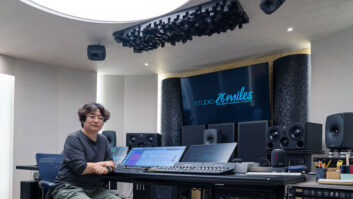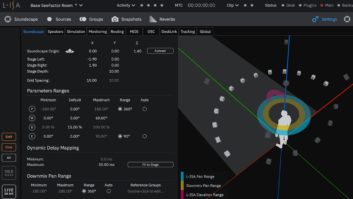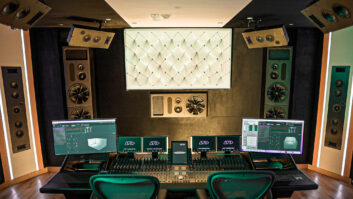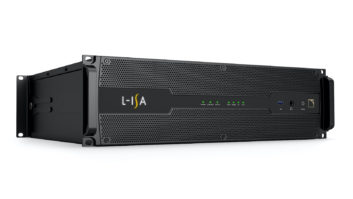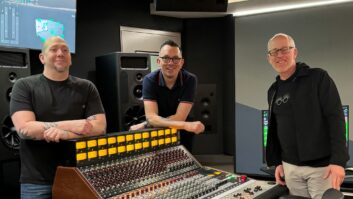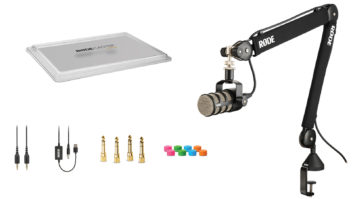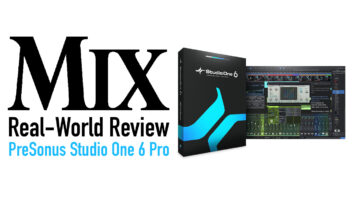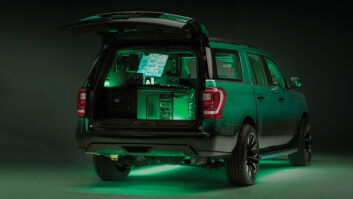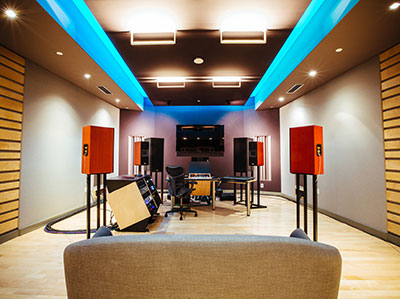
While iZotope’s professional audio software products are considered core components of many music and film/TV post-production studios, the company recently opened a studio to expand upon one of its own core tenets: education.
iZotope, based in Cambridge, Mass., recently built two studios—a mastering/critical-listening environment and a mixing/production control room—designed specifically for educational programs and product testing. Jonathan Wyner, an audio engineer since 1983, was hired last year to be the studio’s education director. (Wyner had been consulting with iZotope for the previous 10 years.)
“I was asked to lead the studio design project, to build the new studio facilities and offices here, about two-and-a-half years ago, and I was hired as education director last year,” Wyner says. He was put in charge of building the studio from the ground-up. Wyner hired renowned acoustician Fran Manzella to design the rooms. “I contacted Fran based on his excellent work and reputation to design the studio,” Wyner says. “How many times do you get to be involved with building a studio on this level? For me, exactly twice.”
That first time was when he designed his own studio, M Works, also in Cambridge, back in 1991, where Wyner is also chief mastering engineer. “It’s a great joy and pleasure to build a new studio, especially in this day and age when rooms are closing as opposed to opening.”
The two studios opened in April 2015. The mastering suite is roughly 550 square feet, and the control room is approximately 450 square feet, with a 250-square-foot acoustic recording/capture space.
According to Wyner, the design principles of the studios were that they must have superlative acoustics and monitoring; they must be neutral, quiet, accurate, revealing and pleasant environments to be in, and they had to have the flexibility to host various workflows and uses, including product design, evaluation, development and testing; sound design; and hosting community and educational events.
The studio is also an employee perk—the staff is allowed to use the space during evenings and weekends to work on their personal projects.
“It’s been a fantastic addition to the company,” Wyner says. “It’s like when you build a new kitchen in your house: You think, ‘How did I ever cook before this?’ It’s also great for me to see all the employees in the company understand what it means to have a great studio. Seeing that kind of awareness is really satisfying.”
Both studios have Avid S3 control surfaces. Monitors include PMC MB2S and LB1, Lipinski L-707s, and JL Fathom f113 subs; DAWs include Pro Tools and Sequoia (they use many others to test for product compatibility); and outboard gear includes Dangerous Compressor, Manley Variable Mu, Requisite L2M, Pendulum OCL-2 with custom sidechain filters, Sontec MES 432 mastering EQ, SPL Iron compressor, Empirical Labs Distressors, and Burl Summing Amp. They also have KVM switching solutions from IHSE and networked audio via Ravenna and the Merging Horus Converters.
“We’ve gotten requests from schools all over the world to hold events for educational purposes,” Wyner says. “But most of the projects we host are within reach of the local community, and by that I mean within 150 to 200 miles of our campus.” Activities range from hosting local AES chapter events and music/audio tech programs for area schools to networking gatherings and the company’s brand-new iZotope Mastering Academy.
The Mastering Academy, held for the first time last year, hosted eight participants from countries around the world. The students studied, practiced, were mentored and received feedback over the course of three days. iZotope chose eight students based on their level of experience, as the Mastering Academy was designed to be expert-level training.
“The reason that we did it is the opportunity to be mentored by experienced professionals is something that has been disappearing, for a lot of reasons, including the fact that the studio economy has been in decline for some time,” Wyner says. “When I first started in a mastering facility, I was mentored for five years before I went off on my own. It’s much harder to find those scenarios now, so this was an opportunity to offer a taste of this, where attendees could come in to a superlative listening environment and get feedback on their work, see demonstrations, and provide at least a taste of that kind of direct contact.
“A lot of people are trying to learn from resources like YouTube videos,” Wyner continues, “and it’s really hard to figure out what information is good and what is not. It’s not the same as being able to turn to someone in the same room and say, ‘Listen to this, let’s talk about it.’ That was really the impetus for the Mastering Academy.”
Wyner is the main instructor for the Academy and was assisted by Bradford Swanson, an accomplished educator in his own right. (Wyner is also an associate professor of music production and engineering at Berklee College of Music in Boston.)
“We’re just starting to ramp up activities here,” Wyner says. “Education has always been a core value of the company, but it hasn’t been expressed with some of these kinds of activities before. We’re still in development. Our intention is to repeat the Mastering Academy on an annual basis.”
The studio is also used for product testing—both iZotope’s own products and its competitors. “We test competitor’s products to figure out why people like a certain product, for example,” Wyner says.
Beyond having high-quality monitors and great acoustics, it was important for Wyner to have the switching capability with audio and video and the proper connectivity. “KVM and the Ravenna network gives us so much flexibility to deploy really high-quality audio, and it allows access to any machine from any room.”
Though Wyner is only about a year into his position as education director at iZotope, he has been working as a consultant for the company for the past 10 years. He initially become involved with the company when he discovered that iZotope’s offices were about seven or eight blocks from his mastering studio, where he’s worked with the likes of James Taylor, David Bowie, Aerosmith, Aimee Mann, London Symphony, Miles Davis, Semisonic, Thelonius Monk, Pink Floyd, Cream, Bruce Springsteen and Nirvana. “You have to remember, this was at a time when the idea of mastering software was not so common,” Wyner says. “I thought some of the software available was suboptimal. I decided to pick up the phone and call the company, and I said, ‘Hey, I’m down the street, can we sit down and talk?’ I didn’t expect anything to happen, but they invited me to lunch and said, ‘Tell us about everything you think should be improved.’ They were very open-minded and very interested in giving people something that was very useful to them.
“I think one of [iZotope’s] primary motivations is to build something that will help people do better quality work, and that includes educating them as well,” Wyner continues. “Education has been embraced as a separate activity, it’s about helping people do better work and be happier in their work. It’s really fun to be involved with that here.”
